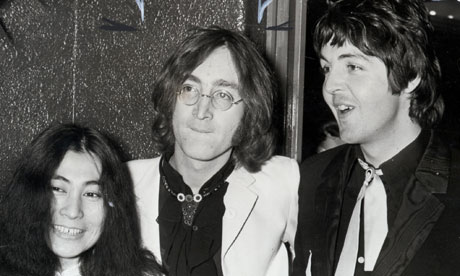
It was almost 50 years ago and in black and white that a fresh-faced David Frost interviewed a baby-faced Paul McCartney and asked him what the future held. "I'd like to retire soon, and the way things are going I might be able to," said McCartney.
Five decades on and neither man has retired, both have reached their 70s, been knighted, and now meet again for one of the longest interviews the former Beatle has ever given.
In the hour-long programme to be broadcast on Frost's television show next month, McCartney lets it be known that Yoko Ono did not break up the Beatles, that he remains still a working-class boy despite his fame and fortune, and that his marriage to Heather Mills is not something he likes talking about. His second marriage does not feature in the interview; photographs show only his 1969 wedding to Linda Eastman then jump to his third marriage a year ago to another American, Nancy Shevell. The acrimonious and very public divorce with Mills is not touched upon in what is billed as a unique "in-depth interview". But it is on rock'n' roll's most infamous break-up that McCartney was uncharacteristically outspoken.
"She certainly didn't break the group up, the group was breaking up," he says, which may do something to dispel decades of hostility directed at Lennon's widow by diehard fans since the group disbanded officially in 1970.
He goes further and says that without Ono opening up the avant garde for Lennon, songs such as Imagine would never have been written: "I don't think he would have done that without Yoko, so I don't think you can blame her for anything. When Yoko came along, part of her attraction was her avant garde side, her view of things, so she showed him another way to be, which was very attractive to him. So it was time for John to leave, he was definitely going to leave [one way or another]."
He says he was in retrospect happy with the timing of the end of the Beatles; they left "a neat body of work" so the split "wasn't that bad a thing".
But McCartney has not completely mellowed with age. He admits he had found Yoko sitting in on Beatles' recording sessions very difficult, but still reserves bitterness for the late Allen Klein, the businessman who tried to take over the void left when the group's manager Brian Epstein died in 1967. Throwing a mock punch at a photograph of the man's face, he says it was Klein who set McCartney fighting against the others: "I was fighting against the other three guys who'd been my lifelong soul buddies. I said I wanted to fight Klein."
He tells Frost it was the loss of their mothers at a young age â€" McCartney's mum died when he was 14 and Lennon's when he was 17 â€" that helped shape them into becoming such successful musicians: "That was a big bond with John."
He talks too of the loss of Linda, the mother of four of his five children. He admits that despite the family trying everything to hold back the cancer that killed her, he had known from the first diagnosis she would not survive. "The doctors had told me privately that we'd caught it too late, that she'll have about 18 months. And that was what she had."
On a happier note, the world's most successful songwriter says his role to his five children, Mary, Heather, Stella and James with Linda and eight-year-old Beatrice with Heather Mills, and eight grandchildren is the most important one of his life. "Being a father, grandfather, is my coolest thing."
McCartney is apparently known for only giving 15-minute interviews and he has managed to achieve a great deal of privacy over his personal life throughout his career. This latest meeting between the two British legends is billed as Frost's return to the "Nixon-style" interviews for the TV channel Al Jazeera English, where he has worked since its launch in 2006. The 73-year-old Frost said of the 60-minute episodes, which start on 9 November: "The longer conversation not just allows us to go into more depth, but relaxes interviewees to talk more about their life and work."
No comments:
Post a Comment